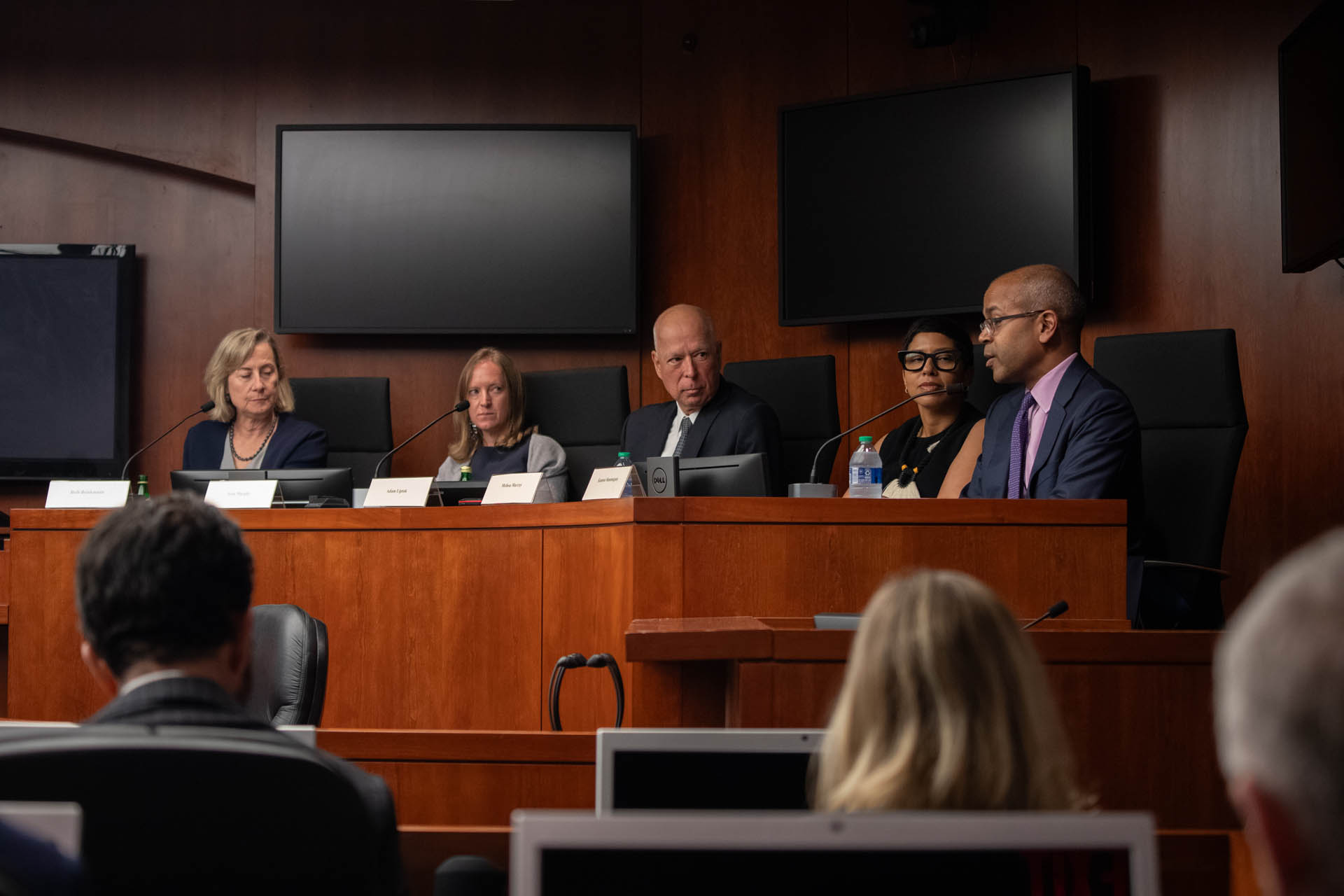Law School Hosts 36th Annual Supreme Court Preview
A few days after the Supreme Court convened its 2023-24 term, the nation’s leading legal scholars, federal judges, lawyers, and legal journalists from across the country gathered at William & Mary Law School to discuss the Court’s upcoming Term and to review some themes coming out of the last one. Hosted by the Institute of Bill of Rights Law (IBRL), the Supreme Court Preview is one of the Law School’s preeminent annual events.
View this year's Supreme Court Preview Gallery.
Professor Alli Larsen, Director of the IBRL, was quite pleased with the 36th annual Preview, which was held on October 6-7 this year: “this is always one of my favorite weekends of the year. The panelists who come are really the “who’s who” of Supreme Court experts – and they are so generous with their time and expertise. We are very fortunate that our law school is the home to such an amazing event every year. It is a tradition I know I am not alone in cherishing.”
Before the Preview opened this year, William & Mary students had the unique opportunity to meet and network with some of the panelists during a special “student greenroom” event. Joan Biskupic, Senior Supreme Court Analyst at CNN, also signed copies of her new book during this time.
The Preview officially opened with a moot court (intended for educational use only) of United States v. Rahimi, a case that examines whether the government may constitutionally forbid people subject to domestic violence orders from having guns. The issues debated in the moot court included whether there existed an appropriate historical analogue, applying the Bruen standard, to this kind of regulation.
 Following the moot, a panel of experts reviewed the last Term and offered thoughts on broader themes. Moderated by Adam Liptak (New York Times) the discussion featured Melissa Murray (NYU School of Law), Beth Brinkmann (Center for Reproductive Rights), Kannon Shanmugam (Paul, Weiss,), and Erin Murphy (Clement & Murphy). In a lively conversation these experts addressed whether the Court faced any interpersonal conflicts or concerns about its public image and, indeed, predicted whether these factors would influence the court’s decisions at all.
Following the moot, a panel of experts reviewed the last Term and offered thoughts on broader themes. Moderated by Adam Liptak (New York Times) the discussion featured Melissa Murray (NYU School of Law), Beth Brinkmann (Center for Reproductive Rights), Kannon Shanmugam (Paul, Weiss,), and Erin Murphy (Clement & Murphy). In a lively conversation these experts addressed whether the Court faced any interpersonal conflicts or concerns about its public image and, indeed, predicted whether these factors would influence the court’s decisions at all.
The next morning’s panels tackled Administrative Law challenges on the docket this Term and then discussed “Recurring Procedural Problems,” such as the shadow docket and nationwide injunctions. It continued with a panel of federal judges, featuring Judges Stephanos Bibas (U.S. Court of Appeals, Third Circuit), Toby Heytens (U.S. Court of Appeals, Fourth Circuit), Robin Rosenbaum (U.S. Court of Appeals, Eleventh Circuit), and David Stras (U.S. Court of Appeals, Eighth Circuit). The judges discussed the importance of collegiality on the bench and shared advice on how they maintain good relationships with colleagues of differing ideologies. 
The Supreme Court Preview concluded with some of the most newsworthy topics on the docket this term, with panels on “Online Speech and the First Amendment,” election law, civil rights disputes, and more. Video recordings of the panels will be available on our YouTube channel.
About the IBRL
The mission of the Institute of Bill of Rights Law (IBRL) is to contribute to the ongoing national dialogue about issues relating to the U.S. Constitution and our Bill of Rights. One of the guiding philosophies of the Institute is the conviction that our collective understanding of constitutional issues is enhanced significantly when experts from diverse disciplines — lawyers, journalists, historians, political scientists, economists, sociologists, and politicians—are brought together for serious discussion and debate. Following this interdisciplinary approach, the Institute provides a forum for airing and debating matters of law and policy as a means of increasing our understanding of important constitutional issues. The Institute has been actively involved in its mission since 1982, when it was founded at the law school. The Institute performs its functions in a manner consistent with its ties to a professional school and an institution of higher education. It undertakes no lobbying and adopts no partisan political stance.